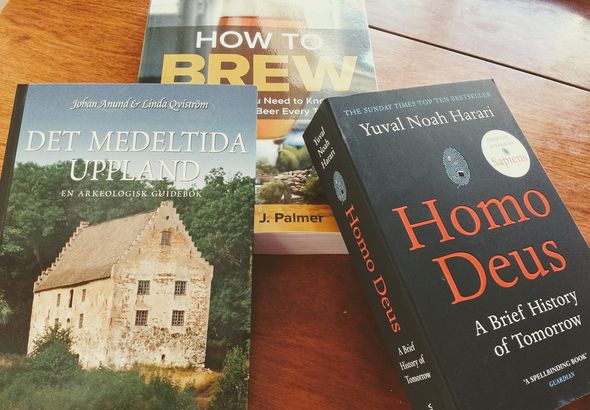A few notes on my (not so) recent book diet.
The Strange Order of Things: Life, Feeling, and the Making of Cultures by Antinio Damasio.
I really wanted to read that one after listening to this interview
with the author, but I did not make it very far before I got bored. My bad! I might re-visit it some day.
Related in the discussion of feelings is this podcast that I just listened to - quite interesting!
I must have mentioned before how much I enjoyed the 40th anniversary edition of Dawkins' The Selfish Gene, in which
he reads the audio version of his current commentary, in dialogue with his former self. In the meantime I have read or listended
to two more of his books: The Blind Watchmaker was good, but I liked The Extended Phenotype less, since it is written
more for a more specialist audience and is very careful about details and nuances, which can make it tedious for
laymen readers.
Stephen Fry has written (and recorded audio for) two books about ancient Greek mythology. Mythos covers the gods and creatures
that were around before mankind came into play, and how all that came to be. The second part, Heroes, is about Hercules, Jason
and their like, concluding with Theseus. Both are overall very enjoyable, not the least because of Fry's excellent reading.
I stumbled upon the semi-famous commencement speech by David Foster Wallace which
is very much worth your time, if you don't know it yet. Prompted by that, I also read some of the essays in his collection A Supposedly Fun Thing
I'll Never Do Again, with mixed feelings. He certainly can write and has some good insight into the human condition, so
I think I understand why he gathered a fan-base. But something bothered me with his writing, maybe it felt pretentious, overly
showy, or I cannot quite put my finger on it. Still, the title story about his trip on a cruise ship was great fun!
Another book that I did not finish is Against Empathy by Paul Bloom. This is not because it is bad or I found it unconvincing, on
the contrary! I just had heard him make the major points of the book in several podcasts (Sam Harris &
Very Bad Wizards) and needed no more convincing than that to appreciate the distinction
between compassion and empathy and that the side effects of the latter are too often neglected. So be sure check out the book, if that
sounds wrong (or right) to you!
